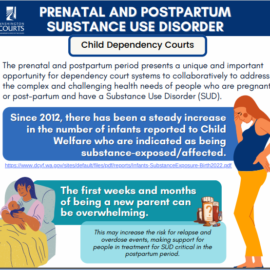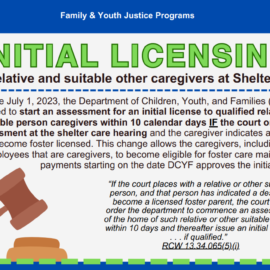This infographic provides information on the complex needs of women who are pregnant or post-partum and have a Substance Use Disorder (SUD), along with resources that support dependency court systems in improving outcomes for these families.
Initial Licensing for Kinship Caregivers
Kin-First Culture
Hear about the different kin-first culture initiatives at DCYF and learn about the unique needs of kinship caregivers, including the resources available to kinship caregivers. 60 minutes
Safety Planning in Action: Collaborative Safety Planning in Snohomish County
Joint presentation from parent attorneys, parent allies, and DCYF staff in Snohomish County about how their dependency court system collaborates to create safety plans that allow families to safely remain together. 90 minutes
Statutory Overview of the Keeping Families Together Act
Overview of the statutory changes contained within the Keeping Families Together Act legislation. 70 minutes
Behind the Bill: Keeping Families Together Group Fishbowl Conversation
Hear from members of the Keeping Families Together Group on the intent, purpose, and goals of the Washington State Legislature in passing the Keeping Families Together Act. 60 minutes
Child Safety & Harm of Removal Recorded Webinar
Shelter Care THINK TANK
State Statutory Framework
Carissa Greenberg[1] 2022[i] Introduction There are many Washington statutes that affect children involved in the child welfare system both directly and indirectly. These statutes include titles on mental health, state Medicaid, services for persons with developmental disabilities, education, and juvenile dependency and termination of parental rights. Select statutes are discussed below. RCW Title 13 Title 13 of the Revised Code of Washington contains laws affecting juveniles and juvenile courts. The chapters which most often affect children involved in the child
The Influence of Federal Law on State Child Welfare Proceedings
Carissa Greenberg[1] 2022[i] Introduction The federal government’s entry into the child welfare field is relatively recent. It has only been during the past approximately 50 years that Congress has addressed child welfare issues (although it provided assistance to children living in poverty before then). Since the mid-1970s, through a number of federal funding statutes, Congress has shaped the public policy of the child welfare system and has established the parameters of juvenile dependency and termination of parental rights law in







